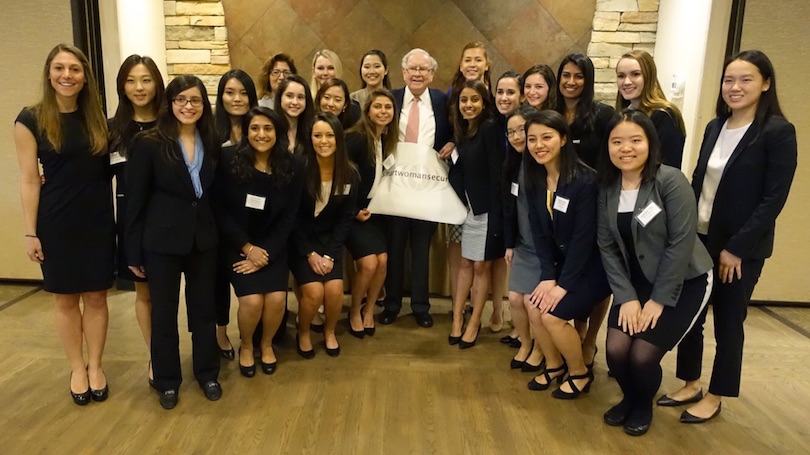
Menu
- Public Policy
- Leadership
- Funding
- News & Events
- About the Center
Back to Top Nav
Back to Top Nav
Back to Top Nav
Back to Top Nav
Having been elected as the Chief Executive Officer of Smart Woman Securities’ Dartmouth Chapter for the academic year 2017-2018, I was given the opportunity to embark on a field trip to meet with and learn directly from Mr. Warren Buffett in Omaha, NE hosted by Smart Woman Securities National. Ever since my sophomore fall, I have been an active Research Analyst, and then Investment Board Member in Smart Woman Securities – a national organization that exclusively educates women on evaluating businesses and pitching stocks. Although I had participated in panels talks such as the “100 Women in Hedge Fund” hosted by Morgan Stanley and went on Corporate Treks to meet with asset managers like Fidelity and Eaton Vance, my excitement about this coming trip to meet Mr. Warren Buffett was unequaled.
For the Warren Buffett Trip, 20 members with leadership positions were selected from 23 existing chapters and represented 14 universities across the country. On our trip, we would first meet with each other to discuss best practices to promote Smart Woman Securities on our respective campuses and empower women who wish to learn about financial planning and investment. Then, we would have dinner with leading Omahan business executives, and visit subsidiaries of Mr. Buffett’s conglomerate Berkshire Hathaway. These tours built up to the moment we most anticipated – meeting Mr. Buffett over a steak luncheon at his favorite restaurant, Anthony’s. We sat closest to Mr. Buffett, and around us were other students from other universities, business schools and even from China. The Q&A session started with his philosophy in investment. To this, Mr. Buffett said something I would never forget:
“Investing is a game in which the odds are stacked in your favor. You can play the game in our terms, when you want to. You just wait till the right pitch to swing at. A baseball batter can choose when to swing, but he is bound by the 3-strike rule; you can really swing whenever you want.”
Indeed, Mr. Buffett as an investor is patient, is observant in the investing game, and is eternally optimistic. He believes that investing profitably is in his control, and it is he who is responsible for his investments. His motto to buy when people fear and to fear when people buy excessively also shows that he is cautiously optimistic about his chance of success by virtue of knowing the fundamentals of his targets, and remaining uninfluenced by commotion. Then, he went on to speak about Berkshire Hathaway’s philosophies: it is characterized by extreme decentralization in the management of its subsidiaries, and by extreme centralization in the investment at its headquarters. Indeed, the investment decisions are handled by Mr. Warren Buffett and his Vice President, Mr. Charlie Munger. Their head office in Omaha is on one floor and run by a handful of members, and is where Mr. Buffett made investments without any flat screen TVs or computers. In contrast, Berkshire Hathaway’s subsidiaries employ 316,000 employees and are in a wide range of industries, from food and restaurant to insurance, from consumer retail to energy. Managers of these subsidiaries can run their companies the way they want without having to report to Mr. Buffett quarterly or attending meetings with other subsidiaries’ managers, as long as they report their financials accurately at the end of the year. Mr. Buffett said, this is because Berkshire Hathaway is run on a culture of mutual trust and respect. It is this culture that motivates its employees and managers to commit to their companies for an indefinite period of time. For example, after her company was acquired by Mr. Buffett, Mrs. Rose Blumkin, the founder of Nebraska Furniture Mart, continued to work at what is now largest home furnishing store in North America until she turned 103. The relationship-oriented culture is also reflected in Mr. Buffett’s commitment to buying and holding the corporations for an indefinite period of time.
Last but not least, we asked Mr. Buffett about his Giving Pledge, which billionaires around the work sign to pledge to give away 99% of their wealth to worthy causes of their choices upon their passing. To this, Mr. Buffett remarks, “The market system rewards me outlandishly for what I do, but that doesn’t mean I’m any more deserving of a good life than a teacher or a doctor or someone who fights in Afghanistan.”
I was in awe. Having experienced one surprise after another when learning about Mr. Buffett’s ingeniousness and ambitions at such a young age, his calculated risk loving attitude as well as his multinational conglomerate built completely on mutual trust and responsibility, I now realize: I am most humbled by his compassion and faith in humanity. The fact that he voiced advocacy for improving the tax system to help teacher of a public school system, a doctor or a soldier shows that Mr. Buffett believes in the positive net gains associated with helping others financially equally; he believes that most people are trying to do good in our society and therefore deserving of support when most in need. He rises above the common fear of people taking advantage of such a system and becoming disincentivized hard work. Being in his presence to hear his reasoning has helped me appreciate and distill the lessons Mr. Buffett teaches. They are unrelated to investment or management strategies, but are not any less valuable – the lessons about radical compassion and justice.
- Submitted by May Nguyen '18, Rockefeller Mini-Grant Recipient
The Rockefeller Center's Mini-Grants program funds registration fees for students attending conferences, as well as the costs of bringing guest speakers to Dartmouth. The views and opinions expressed here are the author’s own and do not necessarily represent the views and opinions of the Rockefeller Center or constitute an endorsement by the Center.